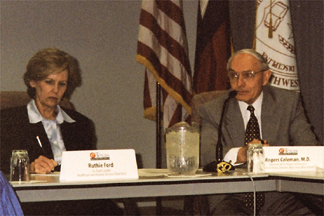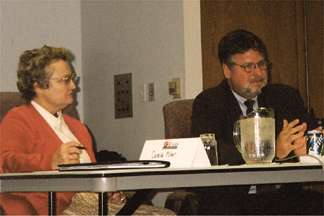| Health Care & Human Services Task Force
Dallas, April 27, 2000
Comptroller's Office Hears Healthcare Concerns in Dallas
The Internet is impacting the medical environment in a positive way, according to testimony heard at the health and human services task force public hearing in Dallas.
"The Internet is producing revolutionary changes in the structures, relationships and thinking in medicine," said Dr. Ricardo Martinez, senior vice president of Health Affairs for Healtheon/WebMD.

|
Task Force Co-Leader Ruthie Ford
and Rogers Coleman, M.D. at the meeting in Dallas
|
The April 27 hearing was one of several the Comptroller's office is holding in connection with Comptroller Carole Keeton Rylander's e-Texas initiative. E-Texas is a citizen commission charged with developing recommendations to help Texas state government meet the challenges of the Internet Age.
Major Issues
Major issues discussed by panelists included:
-
Defining the future of the Internet in health care,
-
Moving the uninsured in Texas to insurance,
-
Making health care more affordable, and
-
Changing health care subsidies to account for the aging population.
Panelists commentary
"The Internet is changing the world of Medicine," Dr. Ricardo Martinez said. "It's improving the doctor-patient relationship, improving the business of medicine and improving the practice of medicine."
By providing medical information on the Internet, better dialogue is created between the doctor and the patient, Dr. Martinez said. Patients are more educated, more involved in their medical decisions and more informed about the many different choices of medical care.
Dr. Martinez did mention some concerns, primarily the credibility and the accuracy of the information found on the Internet. He said to look for information from credible sources.
The business of medicine is more cost effective when the Internet and technology are used, he said. Technology allows for the tracking of trends in medicine, the electronic filing of insurance claims and for an electronic-based atmosphere rather than a paper-based one.
The practice of medicine is enhanced, he said. Doctors will know immediately if a drug prescribed to a patient conflicts with any other drugs that patient might be taking, by using electronic files instead of paper. Medical histories could be stored electronically rather than on paper, allowing for the transfer of files to be immediate.
Dr. Martinez concluded that the Internet and technology would create true health care systems. He said the Internet would empower the public to engage in wellness and health management for themselves. It also would help decrease medical errors and provide doctors with better, more effective tools.
Don Gilbert, commissioner of the Texas Health and Human Services commission, said CHIP (Children's Health Insurance Program is taking applications electronically. He said this reduces time and allows the application information to be transferred to other children's health care programs should the applicant not qualify for CHIP.
Gilbert spoke primarily about the three different insurance programs in Texas for children:
-
Medicaid is for children of families with an income up to 185% of the federal poverty level.
-
CHIP is for children of families with an income up to 200 percent of the poverty level.
-
The Healthy Kids Program is for children that might not qualify for Medicaid or CHIP.
Gilbert pointed out that 1.4 million Texas children are uninsured. Of those, 600,000 are eligible for Medicaid, but are not enrolled. According to Gilbert, one reason they may not be enrolled is the burdensome nature of the Medicaid enrollment process. The CHIP application is one page, front and back, and the Medicaid application is longer. Texas enrolls 55 percent of the eligible population compared to a national average of 52 percent. Of the uninsured Texas children, 85 percent live in a family with at least one working parent. As of this time, 53,000 calls and applications have been filed for CHIP.
Gilbert warned of some concerns of the Health and Human Services Commission with CHIP.
"We want to guard against crowding out the private insurance market," Gilbert said. "We want to look at methods to keep children in private insurance when we can, and use CHIP for those with no insurance."
CHIP is very low cost insurance and has an extremely rich array of benefits. Gilbert estimated that as many as 56,000 insured children will end up in CHIP.
Dr. Rogers Coleman, chairman of Health Care Service Corporation and president of the Texas division of Blue Cross/Blue Shield, addressed health care trends, the role of the Internet and how to insure more people at affordable costs.

|
|
Volunteer Camille Miller and Don Gilbert, Commissioner of the Texas Health and Human Services Commission
|
He believes that computer technology is a tool to help an individual develop a lifetime health plan that would be the property of the individual. He stated that the Internet is increasingly bringing education and resources to individuals to improve their health and is fundamentally changing history in the area of health care.
For all of history, the supply side, or the health care provider in this case, has controlled commerce, particularly in health care. But, according to Dr. Coleman, the world is moving to control by the demand side, or the patient, because of the health information available on the Internet. He believes health consumers will come to control the health care delivery and financing facets of health care.
Dr. Coleman stressed the importance of personal responsibility in health and wellness, including realizing the importance of insurance. Dr. Coleman said life-style issues must be addressed through education and community health improvements. One of those issues is the mindset of some Americans that going to the emergency room every time they are sick is better than having insurance. This attitude must change. He offered several market-based solutions:
First, individual, refundable tax-credits could be used to purchase some form of insurance. The tax credit could not be used for any other purpose, and would encourage the uninsured to get insurance, and the people with insurance would get a tax break.
Second, Dr. Coleman called for fewer mandates on insurance companies. He said people should be able to design, for the most part, their own benefits. For example, a single male would probably not need prenatal and pregnancy health coverage, yet most insurance policies are mandated to include that coverage.
Dr. Coleman called for putting an end to insulating health care consumers from costs. Cost is the biggest factor in health care, and he sees the insulation of consumers from costs as a major obstacle that must be removed.
Dr. Tom Saving, e-Texas Health and Human Services task force commissioner, addressed the issue of the aging population. He said, Americans are looking at an overall declining population rate and a higher percentage of people 65 years and older.
In the United States, the young pay for the old, he said. A 20-year-old today will pay roughly $180,000 in tax payments to social security and Medicaid in a lifetime. As the younger population declines and the older population increases, the cost to a 20-year-old 30 years from now will increase.
Dr. Saving suggested implementing a pre-fund system for the younger generation through private accounts to offset the increasing costs of taking care of the older population. This would increase the savings rate and make capital more available. He said this creates a "Capital boom, not a baby boom."
| 
